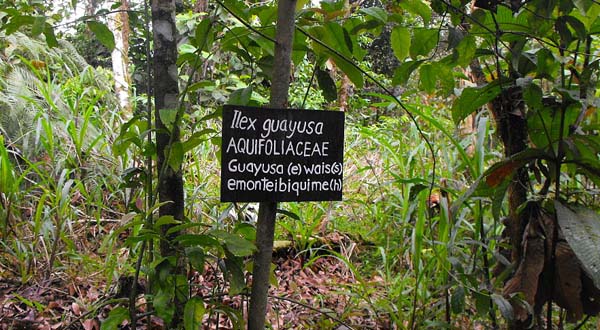Like a lot of travelers, I spent my time in Quito drinking yerba mate from a gourd. But then I headed to the highlands in Ecuador to stay with a local Kichwa (Quechua) family. I was in a for a pleasant surprise when they started brewing tea that I later found out was guayusa. Since then, I’ve become an avid guayusa tea convert – for the health benefits as well as these other reasons.
What Is Guayusa?
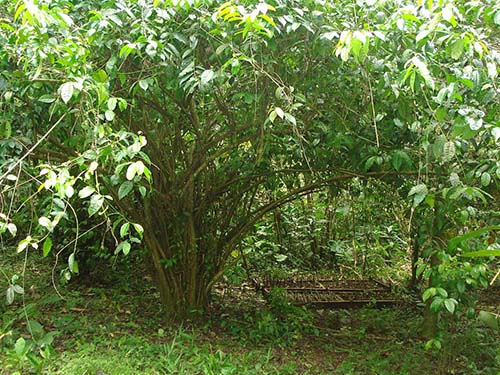
Pronounced gwhy-you-sa, guayusa is a tree related to Yerba mate. It primarily grows in parts of Ecuador between the Amazon Rainforest and the Andes Mountains – an area of incredible biodiversity. The tree can get to be 96 feet tall.
Guayusa has a long history of medicinal use with the indigenous Kichwa people. The plant is also important spiritually. Ancient lore tells how people prayed to the gods for a plant which could teach them how to dream. Twin boys set out on a journey to find the plant. They woke up one night to find a spirit village where their ancestors were, who then gave them the guayusa plant.
Today, local Kichwa people still start the day with guayusa tea. They refer to it as “ancient energy” for the energy boost it gives them.
Even though Yerba mate is incredibly popular around the world, guayusa still isn’t as well-known outside of Ecuador. It wasn’t until 2009 that the Runa company started exporting guayusa to North America. Now, guayusa has started to become popular as an alternative to coffee and tea.
Guayusa vs. Yerba Mate
Compared to yerba mate, guayusa has more caffeine but the effects of guayusa wear off faster. As for taste, most people say that guayusa tastes better than yerba mate because it isn’t as bitter and is smoother. However, others say they prefer the taste of mate.
Guayusa vs. Coffee
Guayusa actually has more caffeine per weight than coffee. However, because you only need 2g of guayusa to make a cup of tea, guayusa ends up having less caffeine per cup: 66mg versus approximately 95mg of caffeine in a cup of coffee. Guayusa also likely has more health-boosting benefits such as anti-inflammatory and antioxidant compounds.
Further, guayusa is a much more ethical beverage to consume. Growing coffee usually involves large amounts of chemical pesticides and fertilizers and farmers are often unfairly paid. By contrast, guayusa is grown in sustainable ways. The price is stable and provides reliable supplemental income for indigenous farmers who grow the guayusa trees on small agro-forestry farms.
Reasons to Drink Guayusa Tea
1. Contains Caffeine
One of the main reason people drink guayusa is because it contains caffeine. A gram of dried guayusa leaf contains anywhere from 17.3 to 75.7 mg of caffeine, which most sources putting the amount at 33mg/g. That means an 8oz cup of guayana tea made with 2g of leaf would contain 66mg of caffeine. (1)
Here’s how guayusa caffeine content compares to other caffeinated drinks:
- Guayusa: 3 to 75.7 mg/g
- Green tea: 4-21.8 mg/g
- Black tea: 7-31.7 mg/g
- Yerba mate: 2-10.8 mg/g
- Italian coffee: 4-19.9 mg/g
*Note that brewed coffee is usually made with 10gs of coffee bean per cup. So, even though the caffeine content of coffee is lower than guayusa by weight, a cup of coffee still has more caffeine than guayusa. (2, 3)
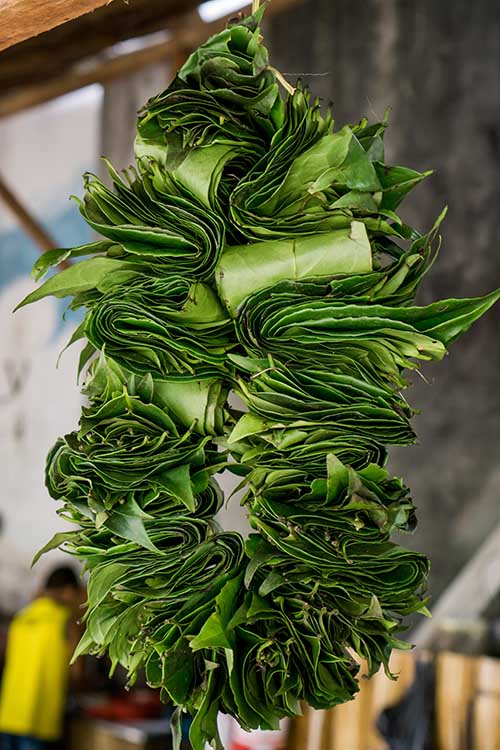
2. Boosts Mood and Concentration
In addition to caffeine, guayusa also contains natural compounds like theobromine and polyphenols. As one study found, these compounds “enhance mood and cognition effects of caffeine and alleviate negative psychophysiological effects of caffeine.”
These benefits is why so many people prefer guayusa to coffee: you get the energy boost from caffeine but with more focus and concentration and less jitteriness. (4)
3. Antioxidants
There has been a lot of research in the past few years about the antioxidant properties of guayusa tea. Overall, the studies have been very promising. One study found 14 phenolic compounds in guayusa tea, including quarcetin.
While guayusa doesn’t have as much total polyphenolic content as green tea, it does show a similar level of protection against oxidative stress as green tea. Importantly, the antioxidants in guayusa aren’t destroyed by blanching. (5, 6)
4. Anti-Inflammatory
In addition to antioxidants, guayusa also contains anti-inflammatory compounds like squalane and amyrin. Inflammation is the root cause of numerous health issues, so drinking guayusa could help treat many issues ranging from psoriasis to IBS.
Squalane (which is usually derived from sharks!) is well-known for improving skin. Thus, it’s possible that research might find applying guayusa tea to your skin could have many skin benefits. (7)
5. Fights Diabetes
One benefit of guayusa is that it can help regulate insulin levels. This is not just important for fighting diabetes, but also for managing weight in general. (8, 9)
6. Supports Biodiversity
Guayusa trees grow in what are known as “charcas”, which are essentially wild forest gardens. The guayusa tree grows right alongside numerous other plants, much like how it would have grown in the wild.
This is in stark contrast to the huge to how many other crops are grown. Huge swaths of forest are cut down to plant fields. The deforestation has a serious impact on the environment and global warming.
7. Organic Practices
Its bio-diverse farming practices mean that guayusa is very easy to grow. Nutrients from nearby plants make it to the guayusa tree, so chemical fertilizers aren’t needed. Likewise, chemical pesticides are not needed (local lore says that drinking the tea even keeps insects from biting you). Even if farmers wanted to use pesticides, they couldn’t: the Runa Company which exports guayusa only takes guayusa which is 100% organic.
Not only are these organic practices better for your health, but they are also better for the environment and help preserve the important ecosystem where guayusa is grown.
8. Helps Indigenous Communities
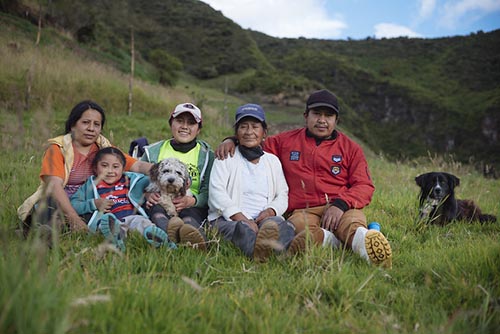
Before guayusa was commercialized, farmers in the region primarily made their money by cutting down trees to sell. Even if the locals didn’t want to participate in deforestation, there were few other job opportunities.
Thanks to guayusa, farmers are able to have another source of income. In 2014, more than $400,000 in come from guayusa made its way to 3,000 families. Guayusa has become more popular since then, which means even more revenue for indigenous farmers.
In case you are worried about guayusa companies exploiting local farmers (as if often the case with chocolate and coffee), it’s refreshing to know that the Runa company is Fair Trade certified. The company doesn’t work with third parties: they collect the guayusa leaves from farmers directly, pay them immediately, and bring the leaves for processing themselves. (10, 11)

How to Make Guayusa Tea
- Bring filtered water to a boil
- Pour the water over guayusa leaves or tea bag. Use 2-3g of leaves per 8oz of water.
- Let the tea steep for 4-8 minutes (depending on how strong you like it) before removing the leaves.
- Add lemon or honey if you want.
Best Brands of Guayusa Tea
1. Runa Guayusa Loose Leaf Tea
Runa was the first company to sell guayusa internationally. The reason they are my #1 pick for guayusa is because of their eco-friendly and Fair Trade practices. Not only is their guayusa tea leaves organic, but they also pay growers a fair wage and encourage sustainable practices (such as only planting a maximum of one guayusa tree per 4×4 meter area as to keep biodiversity).
You can buy Runa guayusa tea here.
2. Waykana Guayusa Loose Leaf Tea
Waykana is another great brand of guayusa tea. They also use fair trade practices (though aren’t certified as Fair Trade) and their products are certfied organic. I like that the company was started by an actual Ecuadorian from the Amazonian region where guayusa is grown.
The company makes loose-leaf guayusa tea and guayusa tea in bags.
3. Pacha Guayusa Loose-Leaf Tea
This is a smaller brand of guayusa tea. They apparently also support local indigenous communities and their tea is certified organic. I like that they use eco-friendly packaging.
You can buy their tea here.
4. Herbal Goodness Guayusa Tea and Extract

Herbal Goodness is a brand which makes certified organic and Fair Trade guayusa (as well as other herbal teas and products). They are based out of Nigeria but their guayusa is packaged in the USA. The brand is apparently committed to sustainability and they give 10% of profits to the WAAW Foundatioin which supports education for girls in Africa.
If you are primarily interested in the health benefits of guayusa, then choose their guayusa leaf extract (get it here). Or you can get their loose-leaf guayusa or guayusa tea bags.
Pin This!
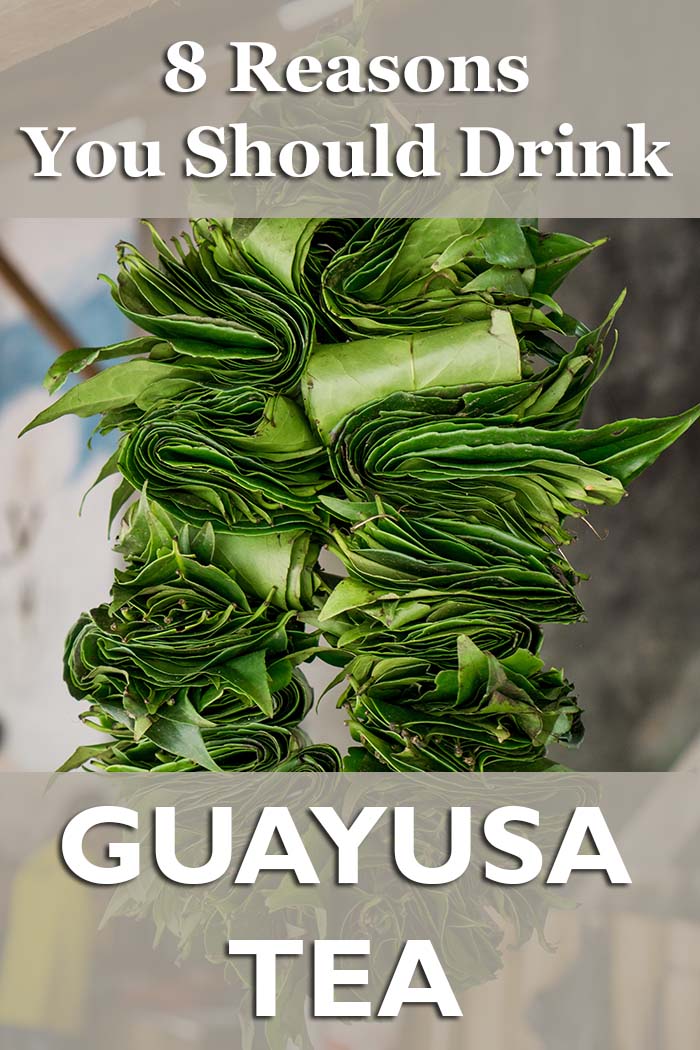
Image credits:
“©UNICEF/ECU/2020/Arcos” (CC BY 2.0) by UNICEF Ecuador,
“Kichwa villagers” (CC BY-NC-ND 2.0) by CIFOR,
Photo_of_Ilex_Guayusa_tree by I $ore9515, Creative Commons Attribution-Share Alike 3.0 Unported license,
Arbusto_de_Guayusa by Jaime Inca Creativecommons by-sa/4.0/ license,
Ilex_guayusa_getrocknet by Wambra Creative Commons Attribution-Share Alike 4.0 International license.
Additional article sources:
https://www.tandfonline.com/doi/full/10.1080/21513732.2017.1303646
https://www.atlasobscura.com/foods/guayusa-tea-ecuador

